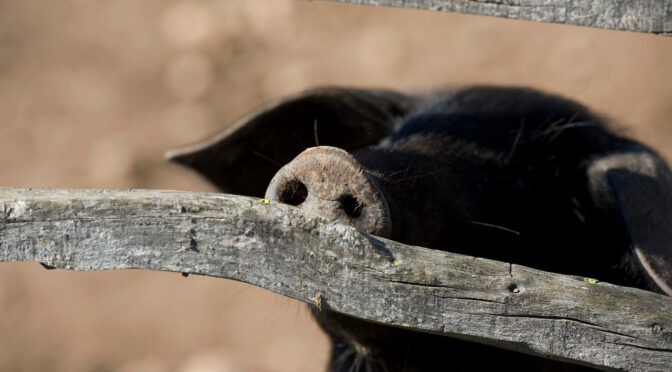Views: 123
Earth Overshoot Day, also known as Ecological Debt Day, marks the date when humanity’s demand for natural resources in a given year exceeds what Earth can regenerate in that year. In 2024, this day falls on August 1st; from this point on, everything we consume depletes the savings accounts of future generations.
To demonstrate that there can be a more respectful way to produce food —economically viable and promoting social justice— , ‘Custodia Agrària’, GOB’s Land Stewardship program, commissioned a study on the ecological footprint of cold meats from these Menorcan farms. The resulting report, prepared by Global Footprint Network, delivers a clear message: it is possible.
The data
The study focuses specifically on the footprint associated with charcuterie production. When considering only the farm’s consumption for producing one kilogram of charcuterie (regardless of the type of environment and habitats within the farm), the ecological footprint is 56% smaller on ‘Custòdia Agrària’ farms compared to the national average for charcuterie production. This significant difference highlights the sustainability of Land Stewardship production practices versus conventional methods, demonstrating that sustainable practices can also be more resource-efficient and cost-effective. Accurate numbers emerge when all factors are included in the equation, rather than externalizing environmental costs as it is often customary.
Several factors are considered in calculating the ecological footprint associated with the production process: land use for growing animal feed, purchase of feed, forages, and fertilizers, their transportation, energy and fuel used throughout the production process, and the necessary labor force.
Among these, the most impactful factor is animal feed; both the land used on the farm and the land required to produce externally purchased feed and forages. Nevertheless, the primary difference between ‘Custòdia Agrària’ estates and conventional farms lies in the “carbon footprint”; Land Stewardship reduces the use of fossil fuels, chemical fertilizers, and the transportation of external feed and relies on shorter supply chains (i.e., local consumption).
The ‘Stewardship Factor’: agriculture that preserves nature
Beyond reducing consumption associated with sustainable production, ‘Custòdia Agrària’ farms offer a unique factor that makes them true “stewards” or “custodians” of the land: the preservation of certain natural habitats. These farms leave more space for nature and biodiversity. This factor, measured by the area occupied (preserved) by forests and scrublands, helps reduce their overall ecological footprint.
This “stewardship factor” is measured in terms of “biocapacity.” It represents a negative ecological footprint as it contributes to increasing the land’s productive capacity in the form of carbon sinks and raw material production.
Taking this biocapacity factor into account, the ecological footprint of Land Stewardship farms is, in fact, 71% lower than the national average for conventional cold meat production.
This new study on the ecological footprint of charcuterie continues the work done in two previous analyses: beef and fruits and vegetables. Both studies concluded that ‘Custòdia Agrària’ products have a lower ecological footprint than the national average for each product: 60% lower for beef and 66% lower for fruits and vegetables.
Help delay Earth Overshoot Day: support sustainable agriculture!
‘Custòdia Agrària’ estates produce a wide variety of products, and there is likely one near you. This map shows all the farms, their products, where to buy them, and their contact information. You can also consult our catalog if you prefer to have all the information about each farm in one document.
The Land Stewardship program works in collaboration with Menorcan farmers to locally address urgent global challenges. Farmers who wish to join the Land Stewardship network sign an agreement for sustainable agricultural practices with no financial transaction and receive support from GOB in this transition. You can learn more about the program in the following video.
This study was made possible with the support of the Consell Insular de Menorca and Menorca Preservation.

